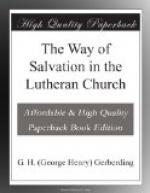We notice thirdly the significant term by which Jesus designates this institution. When he administered the cup He said: “This cup is the New Testament in my blood.” He calls it a testament. A testament is a last will.
Jesus was about to go forth to die. Before he departed, He made His will. He bequeathes to the Church an inheritance. The legacy that He leaves is this sacrament. Before we undertake to study the words of the institution, we wish to impress this thought. A will is the last place where one would use ambiguous or figurative language. Every maker or writer of a will strives to use the clearest and plainest words possible. Every precaution is taken that there may be no doubtful or difficult expression employed. The aim of the maker is to make it so plain that only one meaning can be taken from it.
Neither is any one permitted to read into it any sense different from the clear, plain, literal meaning of the words. Fanciful, metaphorical, or far-fetched interpretations are never applied to the words of a will. Much less is any one permitted to change the words by inserting or substituting other words than those used by the maker. Christ’s words of institution are the words of His last Will and Testament.
We will consider the nature of the Sacrament of the Lord’s Supper in the next chapter.
CHAPTER XIV.
THE LORD’S SUPPER—CONTINUED.
In the former chapter we made some preliminary observations, intended to be helpful, as guards against false conclusions, and as guides to a correct understanding of the subject under consideration. It is important that we always keep these in mind in our study of the doctrine of the Lord’s Supper; Let us ever keep before us therefore the Author or Founder of this institution, the time and circumstances of the institution, and its testamentary character.
We are now ready to inquire further into the nature and meaning of this holy ordinance. And in order to determine this we desire to go directly to the law and to the testimony. We want to know, first of all: what does the Word of God teach on the subject?




